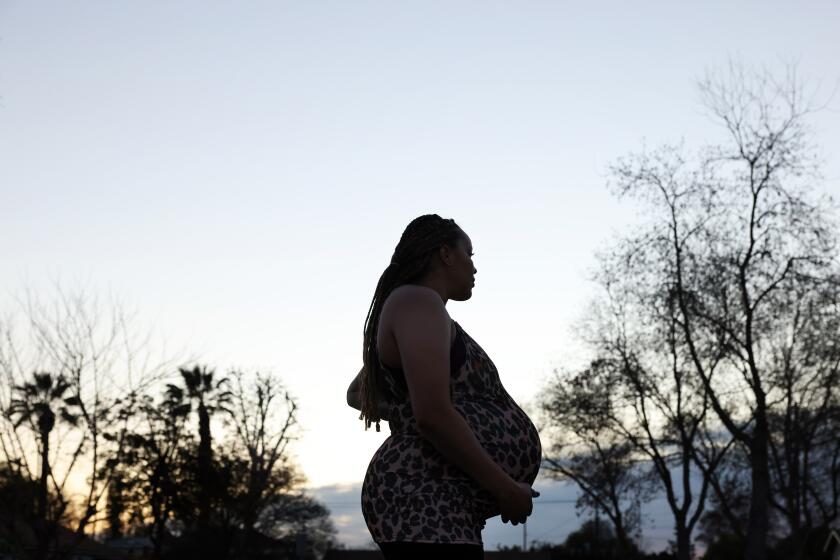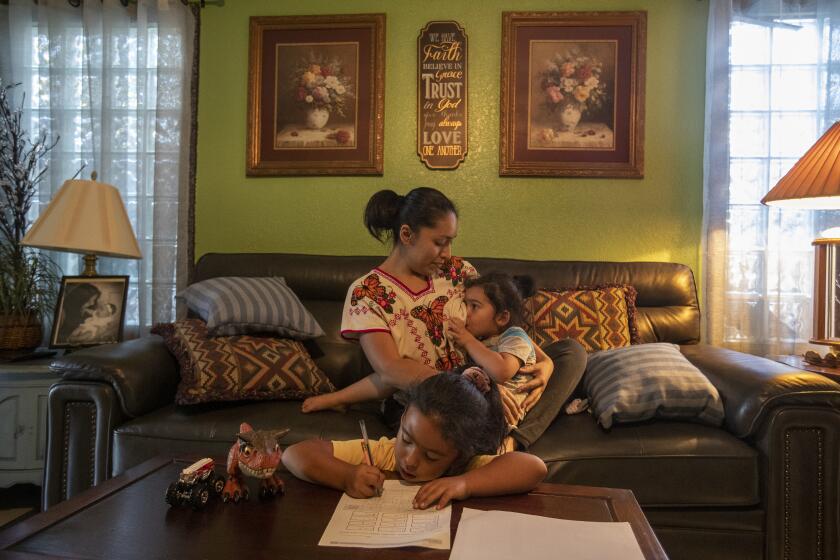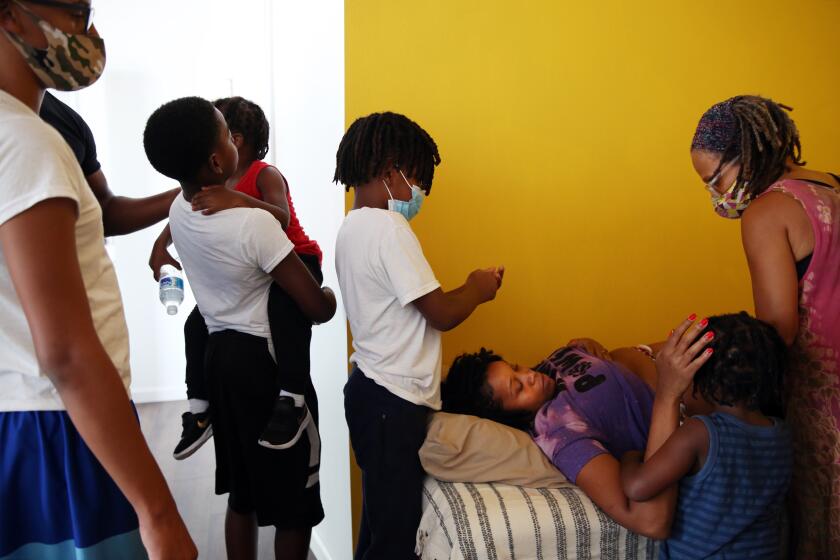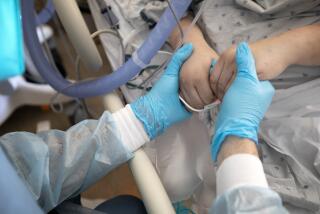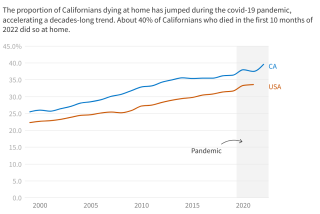Maternal deaths surged during the pandemic. How California is fighting that trend
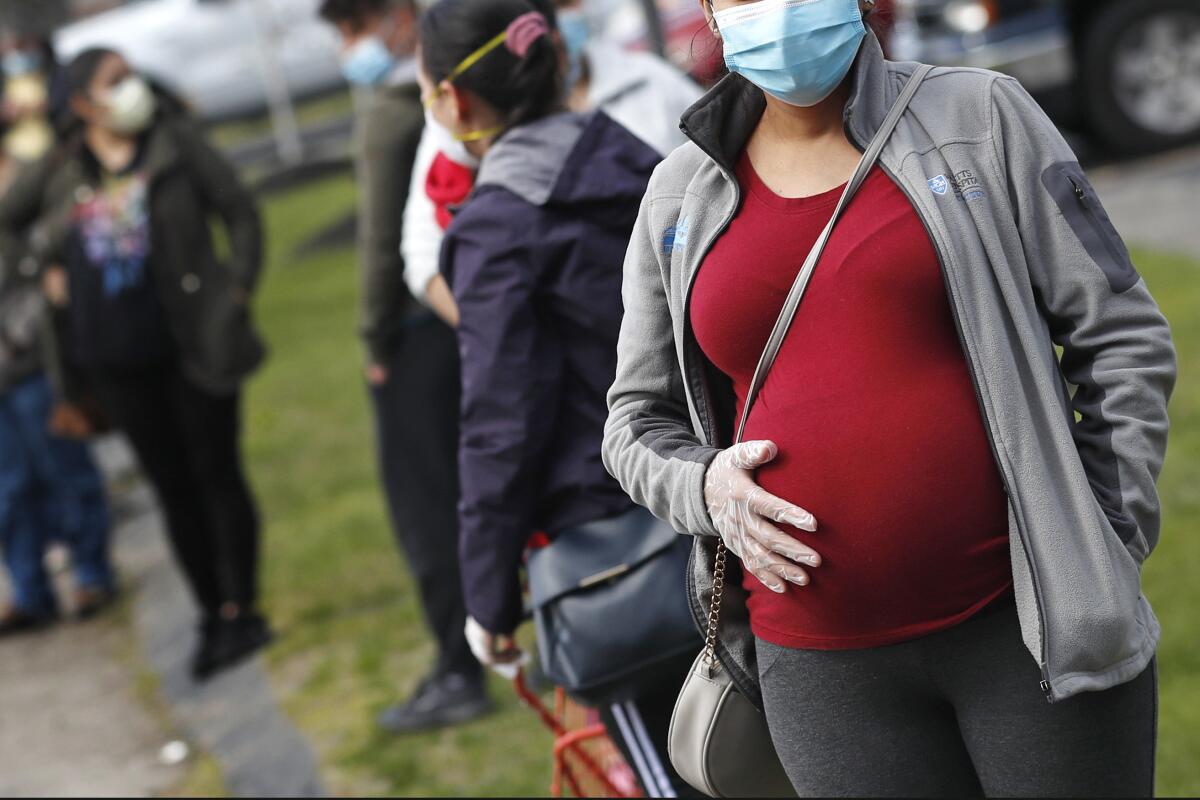
Deaths of pregnant women surged by 40% during the pandemic, according to new federal data. California has been a leader in reducing maternal mortality.
With federal data showing a surge in deaths among pregnant women during the pandemic, California advocates say it is furthering their resolve to continue trying to prevent as many of those deaths as possible.
The National Center for Health Statistics reported Thursday that 1,205 pregnant women died in the United States in 2021, a 40% increase over 2020, when 861 deaths occurred. The total was 754 in 2019.
Pregnant Black women continued to have the highest risk of dying, according to the report. In 2021, the maternal mortality rate for Black women was 69.9 deaths per 100,000 live births, 2.6 times the rate for white women at 26.6 deaths. Among Hispanic women, the report found there were 28 deaths per 100,000 live births.
The report did not specify the causes of death or provide state-by-state data, but a federal Government Accountability Office report released in October found that a quarter of maternal deaths in 2020 and 2021 were COVID-19-related.
An L.A. birthing center aims to bring Black women the comfort of feeling valued and understood.
“We’ve been dreading to see the actual numbers,” said Dr. Elliott Main, medical director for the California Maternal Quality Care Collaborative, which brings state agencies, hospitals and health provider associations together to look for ways to prevent pregnancy complications and deaths.
“It sort of overwhelms all the other work that we’ve been doing to work on deaths from hypertension, deaths from hemorrhage, and deaths from blood clots,” Main said. “All those are now overwhelmed or are minimized by the pandemic.”
In recent years California has become a national leader in reducing maternal mortality. The rate of maternal deaths in California in 2006 was 16.9 per 100,000 live births, according to the California Maternal Quality Care Collaborative. By 2016, the rate had declined by 65%.
There were 18.6 maternal deaths per 100,000 live births in 2020 in California, up from 12.8 in 2019, according to the state Department of Public Health.
Among pregnant women in California, cardiovascular disease was the leading cause of death between 2018 and 2020, followed by hemorrhage, sepsis, thrombotic pulmonary embolism, and amniotic fluid embolism. More than a fourth of the deaths happened the day of delivery.
Not enough of the public is aware of how bad maternal mortality is, said Sonya Young Aadam, chief executive of the California Black Women’s Health Project, a nonprofit based in Inglewood.
She said “it’s mindblowing and heavy” to constantly hear stories from Black people recalling bad birthing experiences that happened to them or family members involving complications, or doctors who did not listen to them. She said too often those stories often include the person feeling something was wrong before, during or after giving birth.
But even amid the lack of awareness, Aadam said she and other advocates try to walk a fine line of informing Black communities about maternal deaths and pregnancy complications without causing fear to the point where people forego pregnancy altogether.
“It’s informing our community that they do have a voice and helping to build the advocacy capacity around this so that people don’t walk away from a situation wondering, ‘What did I do?’” Aadam said. “[It’s so] they go in armed and ready to demand a joyous birth, that they should be able to avail themselves of in any healthcare system in the state. Right now, we know that that’s not what’s possible.”
The new report comes as families, health advocates and health providers express dismay about the numbers of deaths and the pregnant women who did not have the physical, emotional and social support they needed during the pandemic. Pregnant women often had to be isolated in hospitals to prevent potential COVID-19 infections, limiting potential support in hospital rooms.
Parent and community support groups moved from in-person to Zoom calls for the sake of social distancing. Some pregnant women could not maintain social distancing because they were essential workers and were exposed to COVID-19. In addition, public health leaders at the federal, state and county levels have struggled with messaging throughout the pandemic to encourage more pregnant people to get COVID-19 vaccines.
Vaccinated parents say they are continuing to give human milk to their young children beyond six months or a year to protect them from COVID-19.
Main said women giving birth today “are much more complicated patients than we were delivering 20, 30, 50 years ago” because many are 35 or older and come in with high blood pressure, diabetes or other challenges that can complicate pregnancies.
The federal report found 20.4 deaths per 100,000 live births for women under 25, 31.3 for those 25 to 39, and 138.5 for those 40 and over.
When it comes to tackling the severe mortality gaps between Black mothers and white mothers, Main said part of it comes down to differences in rates of high blood pressure, diabetes and obesity. He also cited the “weathering effects” on Black people’s health of continuous, years-long exposure to racism. But implementing protocols all providers must follow for every patient can help reduce complications.
“It’s when you start entering in[to] subjective decision-making that ... the biases enter in,” Main said. “The more we can reduce some of the subjective decision-making, the better we can do to reduce disparities.”
Part of the California Maternal Quality Care Collaborative’s work has included helping develop hemorrhage carts that are now in every hospital statewide, so that health providers can quickly provide care if mothers are losing blood rapidly. The collaborative has also worked with health providers to develop protocols to help mothers experiencing high blood pressure after giving birth, known as preeclampsia.
In recent years, California has also extended Medi-Cal benefits for new parents to 12 months after birth, and is now allowing doulas to become eligible providers under Medi-Cal.
Doulas are considered a key part of providing emotional and physical support and advocacy for mothers before, during and after childbirth, particularly for Black women. The state has also established a fund for midwife training programs that prioritize admitting underrepresented groups.
California was supposed to start paying doulas this year to facilitate healthier pregnancies for Medicaid enrollees. But the benefit has been delayed. Doulas feel lowballed by the state.
The California Black Women’s Health Project has launched Black birth-workers training, and created a business toolkit to help them get started and have support circles for birth workers statewide. The organization is also developing training to help birth workers apply to become Medi-Cal providers.
The organization has also been a fiscal sponsor to help birth workers receive funding from the Los Angeles County Department of Public Health. While progress is being made, Aadam said, there is a need for more “unapologetic investments” in community efforts focused on Black people.
“There are many, many, many, many of us who are going to possibly even perish from this Earth before this issue is truly addressed,” Aadam said. “It’s gonna take time, but however we save somebody along the way, that is what we’re trying to do to reduce those stories — arm our sisters with someone who’s by their side and a team of support around them.”
More to Read
Start your day right
Sign up for Essential California for news, features and recommendations from the L.A. Times and beyond in your inbox six days a week.
You may occasionally receive promotional content from the Los Angeles Times.
